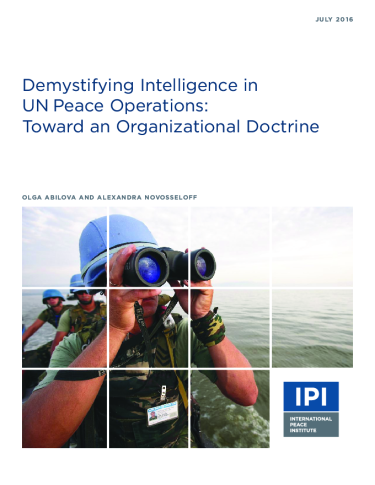In a way, the title of our research paper “Demystifying Intelligence in UN Peace Operations: Toward an Organizational Doctrine,” speaks for itself. We all know that the UN secretariat has been walking on eggs with this issue of intelligence for years; doing it without saying it and without realizing it.
But with peace operations involved in increasing complex and demanding situations and one senses that this “fog about intelligence” can no longer be sustainable. This report complements other earlier attempts to “demystify” that charged term of intelligence and to define what “intelligence” means in the UN context and its peace operations.
The context and limitations
We think that the expression “UN intelligence” is different from the intelligence conceived by each and every member states and that it cannot summarize itself to “military intelligence”. It is different by the mere nature (multidimensional, multinational and multicultural) of the UN and its peace operations because it is a “club” of all countries and distinct from regional organizations or military alliances.
It is different also because UN operations are constrained by several limitations.
The first limitation is the existence of a weak system for the protection of information. The existing classification of documents is unfortunately not linked to any prosecution procedures, no proper system of sanctions to individuals breaking that confidentiality. This creates difficulties in sharing information with parallel forces deployed along peace operations.
A second limitation is due to the need for the UN to keep its impartiality if it wishes to maintain its credibility towards the different parties to the conflict. The line should therefore be drawn at engaging in unethical covert and clandestine methods of information gathering.
The third limitation is its (increasingly difficult) relationship with the host nation depending on the political context, on the degree of acceptance of the UN presence and of the peace/political process. The host-country government is very suspicious of the possibility of the UN mission of “spying” on it or infringing on its sovereignty. One has to say also – it is not political correct but it is a reality – that the presence of national staff in UN missions is, indeed, an asset for better understanding the local environment but can also be an issue in sharing information within the mission.
The needs
Intelligence, in general, is the result of information analysis as well as a capacity to analyze information, along with a capacity to protect it. Fundamentally, we think that what is really needed is for the UN to improve its analytical capabilities in all peace operations, and at all levels, strategic, operational and tactical. This is the reason why we conceived “UN intelligence” as first and foremost a “multidimensional situational analysis”. That analysis is indeed targeted for a specific audience, within a particular decision-making process and is not accessible to everyone. For intelligence to be effective it requires process and structures that favor common assessment, information sharing and integration across the civilian, the police and the military components; it needs to be governed by strict rules and procedures, tasking and guidance.
Improving information analysis can indeed help set priorities in a context where the Mission cannot be present everywhere and to make those priorities evolve over time and circumstances. These improvements in information gathering and analysis must all be geared towards decision-making, to allow decision-makers to make better-informed decisions in order to effective response to the situation. Information analysis is needed to drive practical decisions of the senior mission leadership. They also need to improve the planning process as well as the chain of command and control.
Last but not least, improved “UN intelligence” should serve the larger objective of ensuring the safety and security of the UN personnel and the local populations, and to contribute to obtaining a long-term political solution to the country in crisis.
Intelligence or multidimensional situational analysis is a tool that needs expertise and training, and that has a cost. Strong information gathering and analysis requires adequate training and human resources, as well as the need to increase or strengthen institutional memory of Missions. Training is particularly important when it comes to senior mission leadership; they have to be educated to understand what assets are at their disposal and then request information and provide feedback. They need to use intelligence as a tool in their everyday work with the following understandings:
- It is best being developed in a work environment that is not siloed, where you confront ideas, analysis and information.
- It requires trust to function and this is lacking currently throughout the chain of command.
- Intelligence is not a magic tool: it is useless in the absence of a clear political strategy. Good analysis, multidimensional situational analysis is not a science: it is an art. Modesty and patience are key in using it.
- But the benefits of good intelligence could be dramatic for the UN and its peace operations. It is worth the investment of all member states.
You can download the full report “Demystifying Intelligence in UN Peace Operations: Toward an Organizational Doctrine” here. This report has been written with Olga Abilova from IPI and with the support of the Training for Peace program at the Norwegian Institute of International Affairs (NUPI).
Alexandra Novosseloff is Senior Visiting Fellow at the Center on International Cooperation | Twitter: @DeSachenka
